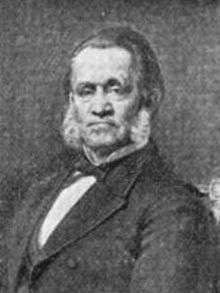James Barrett (Vermont)
James Barrett (May 31, 1814 – April 21, 1900) was a Vermont lawyer, politician and judge who served as President of the Vermont State Senate and a Justice of the Vermont Supreme Court.
James Barrett | |
|---|---|
 | |
| Associate Justice of the Vermont Supreme Court | |
| In office 1857-1880 | |
| Preceded by | None |
| Succeeded by | Russell S. Taft |
| State's Attorney of Windsor County | |
| In office 1854-1855 | |
| Preceded by | Calvin French |
| Succeeded by | John Ward |
| President pro tempore of the Vermont State Senate | |
| In office 1845 | |
| Preceded by | Ebenezer N. Briggs |
| Succeeded by | George T. Hodges |
| Member of the Vermont State Senate | |
| In office 1844-1845 | |
| Personal details | |
| Born | May 31, 1814 Strafford, Vermont, U.S. |
| Died | April 21, 1900 (aged 85) Rutland, Vermont, U.S. |
| Resting place | Evergreen Cemetery Rutland, Vermont |
| Citizenship | US |
| Political party | Whig Republican |
| Alma mater | Dartmouth College |
| Profession | Attorney |
| Signature | |
Early life
James Barrett was born in Strafford, Vermont on May 31, 1814. He graduated from Dartmouth College in 1838, and received a master's degree in 1841. Barrett studied law, first with James Crocker of Buffalo, New York and later with Charles Marsh.
Start of career
In 1840 Barrett began to practice law in Woodstock as Marsh's partner.[1]
In 1843 he became the partner of Jacob Collamer.[2] From 1848 to 1849 Barrett practiced law in Boston, and upon returning to Woodstock he formed a partnership with Andrew Tracy and Julius Converse.[3]
Political career
A Whig, in 1844 and 1845 Barrett was elected to term in the Vermont Senate, and he was chosen by his peers to serve as Senate President in 1845. From 1854 to 1855 he was Windsor County State's Attorney.[4]
In 1857, by now a Republican, Barrett was appointed to the Vermont Supreme Court, where he served until 1880.[5]
In 1865 Barrett received an honorary LL.D. from Middlebury College.[6] Barrett also served as President of the Dartmouth College Alumni Association[7] and the Vermont Bar Association.[8]
Later life
After leaving the bench Barrett resided in Rutland, and practiced law with his son James Crocker Barrett. After the younger Barrett's 1887 death the elder Barrett lived in retirement in Rutland.[9]
Death and burial
James Barrett died in Rutland on April 21, 1900.[10] He was buried in Rutland's Evergreen Cemetery.[11]
References
- New England Historic Genealogical Society , The New England Historical and Genealogical Register, Volume 55, 1901, page 295
- Robert Sobel, David B. Sicilia, The United States Executive Branch: A-L, 2003, page 120
- Lewis Cass Aldrich, Frank R. Holmes, History of Windsor County, Vermont, 1891, page 914
- William Thomas Davis, Bench and Bar of the Commonwealth of Massachusetts, Volume 2, 1895, page 341
- Prentiss Cutler Dodge, Encyclopedia of Vermont Biography, 1912, page 85
- Middlebury College, Catalogue of Officers and Students of Middlebury College], 1917, page 486
- Dartmouth College, Centennial Celebration at Dartmouth College, July 21, 1869, (1869), page v
- Vermont Bar Association, Act of Incorporation, Constitution, Members, and Papers and Addresses, 1882, page 15
- Jacob G. Ullery, Men of Vermont Illustrated, 1894, pages 184 to 185
- Dartmouth College, Necrology, 1900, page 7
- Gravestone photographs, James Barrett, Find A Grave, accessed June 1, 2012
| Political offices | ||
|---|---|---|
| Preceded by Ebenezer N. Briggs |
President pro tempore of the Vermont State Senate 1845 – 1846 |
Succeeded by George T. Hodges |